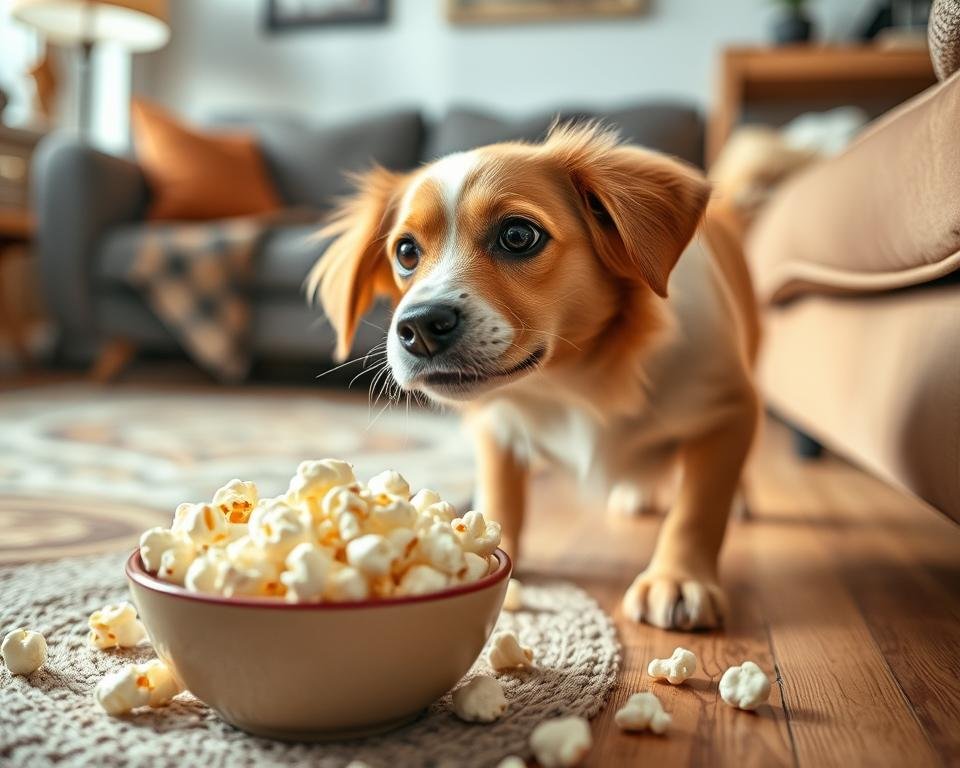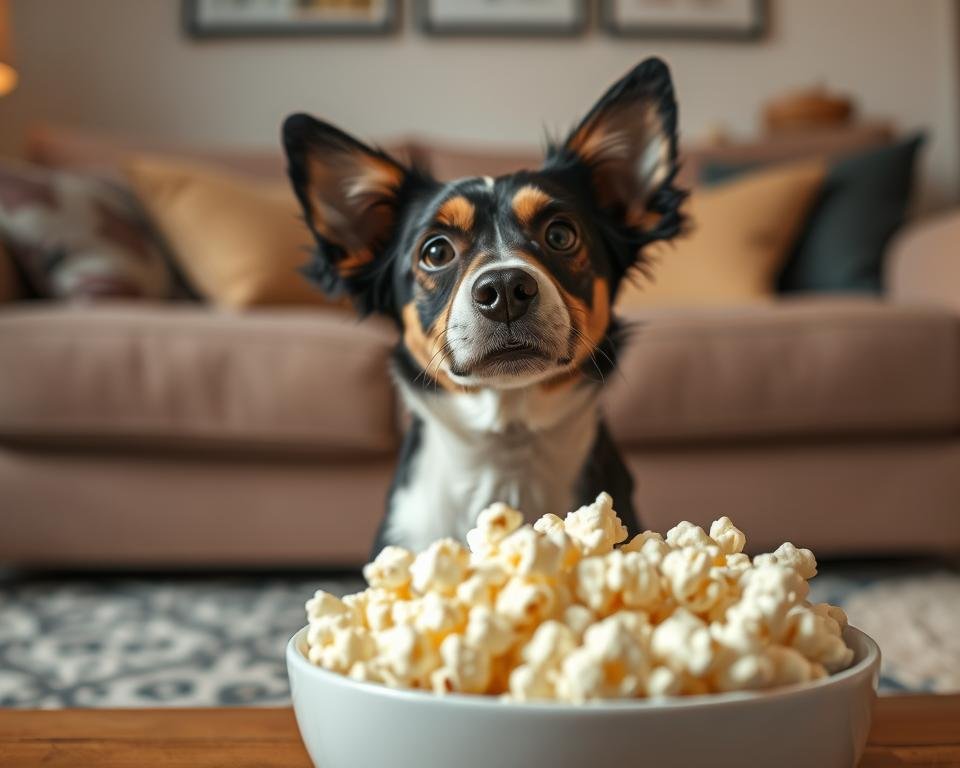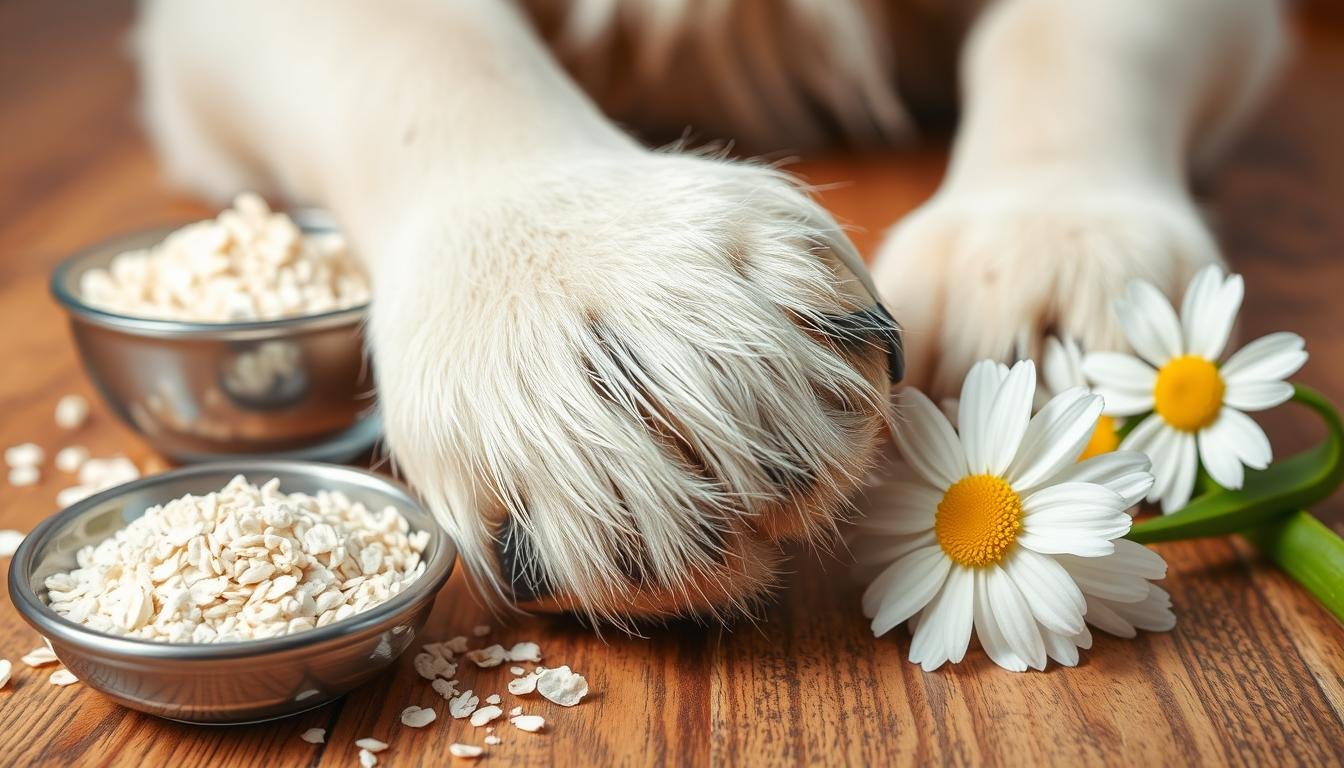As a pet parent, you might wonder if you can share popcorn with your dog. The good news is that plain, air-popped popcorn is safe for dogs in small amounts. But, it’s important to know the good and bad sides of giving popcorn to your pet.
Popcorn has minerals like magnesium and zinc that are good for dogs. It also has fiber, which helps with digestion. But remember, treats like popcorn should not be more than 10% of a dog’s daily food.
Plain popcorn is usually okay for dogs, but toppings are not. Butter, salt, or sugar can cause stomach problems and weight gain. Also, unpopped kernels can be a choking hazard, mainly for small dogs.
Before giving your dog popcorn, talk to your vet. Knowing the safe amounts and risks helps keep your dog happy and healthy.
Understanding the Basics of Dogs and Popcorn
Can dogs eat popcorn? Yes, but there are some things to keep in mind. Popcorn is made from corn kernels that puff up when heated. It has fiber and a bit of vitamins, making it a low-calorie snack for dogs. But, dogs love popcorn for more than just its health benefits.
What Makes Up Popcorn
Popcorn is dried, hardened corn with minerals like magnesium and zinc. When heated, the moisture inside turns to steam. This makes the kernels expand and turn into the fluffy snack we know.
The Appeal of Popcorn to Dogs
Dogs find the smell and feel of popcorn irresistible. The crunchy texture is a big hit with them. But, not all popcorn is safe for dogs to eat.

“Popcorn may be a low-calorie and low-fat snack option for dogs compared to many commercial dog treats, making it a better choice for weight management.”
Can Dogs Eat Popcorn: Safety Guidelines
Feeding dogs popcorn should be done with care and in small amounts. It’s important to follow safety tips to keep your dog healthy.
Only give plain, air-popped popcorn without butter, oil, salt, or toppings. These can upset your dog’s stomach and lead to obesity. Make sure all kernels are fully popped to avoid choking hazards.
- Limit popcorn treats to 10% or less of your dog’s daily calorie intake.
- Always supervise your dog when giving them popcorn to monitor for any signs of discomfort or distress.
“Popcorn may contain essential minerals and vitamins, but dogs should receive their necessary nutrients from their regular high-quality diet.”
Don’t give your dog popcorn with butter, salt, sugar, or caramel. These can cause stomach problems, dehydration, and obesity. Also, unpopped or partially popped kernels can be a choking hazard or get stuck in your dog’s teeth.
While plain, air-popped popcorn is safe for dogs in small amounts, watch how your dog reacts. If you’re worried about your dog’s diet or popcorn safety, talk to your vet.
The Nutritional Benefits of Plain Popcorn for Dogs
While popcorn for dogs might not be the first thing that comes to mind, plain, air-popped popcorn can actually offer some nutritional benefits for our canine companions. Let’s explore how this humble snack can be a healthy occasional treat for our four-legged friends.
Essential Minerals and Vitamins
Popcorn is a source of essential minerals that are important for dogs’ overall health. It contains small amounts of magnesium, manganese, phosphorous, and zinc – all of which play important roles in canine nutrition. Plus, popcorn provides a touch of the B vitamins riboflavin and thiamine. These vitamins help support your dog’s digestion, vision, and energy levels.
Fiber Content and Digestive Health
One of the standout features of is popcorn good for dogs is its fiber content. The fiber in plain popcorn can help promote healthy digestion and regularity in dogs. This is great for pups prone to gastrointestinal issues or those who need a little help keeping their digestive system running smoothly.
Caloric Considerations
When it comes to feeding popcorn for dogs, the low-calorie nature of plain, air-popped popcorn makes it a suitable occasional treat. But remember, treats should not exceed 10% of a dog’s daily calorie intake. Moderation is key to ensuring your pup enjoys the benefits without risking weight gain or other health concerns.
Overall, plain popcorn can be a tasty and reasonably healthy treat for dogs when fed in moderation and as part of a balanced diet. As with any new food, it’s always best to consult with your veterinarian before introducing popcorn or any other human foods into your dog’s diet.
“Accidental ingestion of popcorn is often harmless unless the pet has a history of other diseases,” explains Dr. Jennifer Herring, DVM.
Potential Risks and Hazards of Feeding Popcorn to Dogs
While popcorn can be a low-calorie and low-fat snack choice for dogs, it’s important to watch out for risks. Unpopped kernels are a big choking hazard, mainly for smaller dogs. These hard kernels can block their airways and need vet help right away.
Buttered or salted popcorn can also upset a dog’s stomach. The fat and salt can cause vomiting, diarrhea, and even pancreatitis. Also, sweet toppings like caramel or kettle corn have too much sugar, which is bad for dogs.
Popcorn kernels can get stuck in a dog’s teeth, causing pain and dental problems. It’s important for owners to watch their dogs closely when giving them popcorn and look for any signs of trouble.
Some dogs might be allergic to corn, which is in popcorn. This can cause skin issues, digestive problems, and other health issues.
“Moderation is key when feeding popcorn to dogs, as excessive consumption can contribute to weight gain and other health concerns.”
In summary, while popcorn can be a treat for dogs sometimes, owners need to be careful. It’s wise for pet owners to talk to their vets about how much popcorn is safe for their dogs.
Safe vs. Unsafe Popcorn Varieties for Dogs
When it comes to can dogs eat kettle corn or popcorn for dogs, not all popcorn is safe. Air-popped, plain popcorn is okay for dogs. But, some popcorn types are a big no-no.
Air-Popped Popcorn Benefits
Air-popped popcorn is the best choice for dogs. It’s low in calories and doesn’t have bad stuff like fats, salts, or sugars. It’s a healthy snack that gives dogs some good stuff like minerals, vitamins, and fiber.
Dangerous Popcorn Types to Avoid
- Kettle corn: It’s too sweet and can make dogs gain weight and get sick.
- Caramel popcorn: The sweeteners and toppings can harm your dog’s diet.
- Buttered or salted popcorn: It’s too salty and fatty, leading to stomach problems and obesity.
- Popcorn with chocolate or xylitol: These are toxic to dogs and should never be given.
Unpopped or half-popped kernels can choke dogs or cause dental and stomach problems. Even plain popcorn should be given in small amounts to avoid upsetting your dog’s stomach.
“Veterinarians recommend plain and air-popped popcorn for dogs to prevent gastrointestinal upset.”
Stick to plain, air-popped popcorn and avoid any with extra flavorings or sweeteners. Also, don’t overfeed your dog to avoid health risks.
Butter, Salt, and Other Toppings: What to Avoid
Sharing popcorn with your dog can be fun, but be careful with toppings. Plain, air-popped popcorn is safe for dogs. But, adding butter, oil, or salt can be harmful.
Butter and oil are too fatty and can cause pancreatitis. Salt can lead to salt poisoning, which is very dangerous. So, avoid popcorn with butter, oil, or too much salt.
Sweet toppings like cinnamon-sugar or caramel are bad for dogs. They can cause obesity and health issues. Also, avoid popcorn with chocolate or xylitol because they are toxic.
For a safe treat, give your dog plain, air-popped popcorn. It’s low in calories and can be a fun snack. But, it should not replace their regular food. Always check with your vet about what’s best for your dog.
“Moderation is key when it comes to feeding your dog any human food, including plain popcorn. Stick to small portions and always consult your vet if you have any concerns about your pet’s diet.”
Always put your dog’s health first. Knowing which toppings to avoid will help keep them safe and happy. Enjoy popcorn with your dog in small amounts and with care.
Portion Control and Serving Suggestions
Feeding can dog eat popcorn should be done with care. Popcorn is best as an occasional treat, not a regular part of their diet. Make sure popcorn doesn’t make up more than 10% of their daily calories to keep their diet balanced.
The right amount of popcorn for dogs depends on their size and diet. Small dogs can have a few pieces, while bigger dogs might get a small handful. Always watch your dog when they eat popcorn to avoid choking or eating too much.
Recommended Serving Sizes
- Small dogs: 2-3 pieces of plain, air-popped popcorn
- Medium-sized dogs: 4-6 pieces of plain, air-popped popcorn
- Large dogs: a small handful of plain, air-popped popcorn
Frequency of Treats
Give can dog eat popcorn as an occasional treat, no more than a few times a week. Being consistent and careful with treats is important for your dog’s health. Popcorn should never replace a balanced diet that your vet approves.
“Moderation is the key when it comes to feeding dogs popcorn for dogs. Stick to a few pieces as an occasional treat, and always be mindful of portion sizes and overall dietary needs.”
By following these tips, you can safely add popcorn treats to your dog’s diet. Always talk to your vet for advice on what’s best for your dog’s specific needs.
Learn more about the safetyand benefits of feeding popcorn to.
Signs of Popcorn-Related Problems in Dogs
While dogs can eat popcorn, it’s important to watch for signs of trouble. Look out for these symptoms:
- Gastrointestinal upset: Vomiting or diarrhea after eating popcorn, if it had butter or salt.
- Choking hazard: Coughing or trouble swallowing might mean an issue with kernels.
- Excessive thirst: This could happen if the popcorn was very salty.
- Lethargy and abdominal pain: These signs could mean serious problems like pancreatitis from eating too much buttered popcorn.
Dogs can enjoy popcorn as a treat, but it should be given carefully. Watch your dog closely and talk to your vet if they show any bad signs after eating popcorn.
“Portion control and knowing what’s in the popcorn are key when giving it to your dog.”
Healthy Alternatives to Popcorn for Dogs
Popcorn might look like a tasty treat for dogs, but it’s not the best choice. Instead, give them fresh fruits and veggies. Apple slices (without seeds), carrots, or green beans are great snacks that are good for them.
There are also special dog treats made for different health needs. These treats are made to meet your dog’s specific dietary needs. They are safer than popcorn and fit your dog’s size and health.
- Fresh fruits and vegetables like apples, carrots, and green beans make healthy, low-calorie treats for dogs.
- Commercial dog treats formulated for specific health needs can be a great alternative to popcorn.
- Ensure any treats you give your dog are appropriate for their size and dietary requirements.
By choosing popcorn-free snacks, you can give your dog tasty and healthy treats. Remember, treats should be given in moderation. Always talk to your vet about what’s best for your dog’s diet.
Special Considerations for Different Dog Breeds and Sizes
Feeding popcorn to dogs needs careful thought. Different dog breeds and sizes have unique needs. Small dogs are at risk of choking on popcorn kernels.
Small Dogs and Choking Hazards
Small breeds like Chihuahuas and Yorkies face a higher risk of choking. Their small airways and mouths make it easy for kernels to get stuck. To keep them safe, give only small, fully popped popcorn pieces.
Large Dogs and Portion Sizes
Larger breeds like Labradors can handle bigger portions of popcorn. But, always watch the size of their treats. Popcorn should not make up more than 10% of their daily calories.
Some breeds might be more likely to get fat or have stomach problems. Always check with your vet to see how much popcorn is right for your dog.
“Proper portion control and close supervision are key when feeding popcorn to dogs of any size or breed.”
Knowing your dog’s breed and size helps keep popcorn a safe and fun treat. It’s all about understanding their needs.
Conclusion
In conclusion, can dogs eat popcorn and is popcorn good for dogs? The answer is yes, but only plain, air-popped popcorn. It’s safe for dogs in small amounts. But, avoid popcorn with butter, salt, or sweet toppings as they can harm dogs.
Popcorn might look like a tasty snack for your dog. But, remember to watch the size of the portions. Small dogs like Chihuahuas and Yorkshire Terriers should only have one or two pieces. Larger dogs, like Labradors and German Shepherds, can have a bit more, but not too much.
It’s important to focus on your dog’s balanced diet. If you’re unsure about adding popcorn or other human foods, talk to a vet. With care and moderation, you can give your dog a special popcorn treat now and then.
FAQ
Q: Can dogs eat popcorn?
A: Yes, dogs can have plain, air-popped popcorn as an occasional treat. But, make sure it’s without butter, salt, or seasonings. These can harm them.
Q: Is popcorn good for dogs?
A: Plain popcorn has minerals like magnesium and zinc, which are good for dogs. It also has fiber. But, it should not be a big part of their diet.
Q: Can dogs eat kettle corn?
A: No, dogs should not have kettle corn. It has too much sugar, which can harm them and lead to obesity.
Q: What are the risks of feeding popcorn to dogs?
A: Unpopped kernels can choke dogs. Popcorn with butter or salt can upset their stomachs. It also raises the risk of pancreatitis and obesity.
Q: How much popcorn can dogs eat?
A: Dogs should only have popcorn that’s 10% or less of their daily calories. Adjust the amount based on their size and diet.
Q: What are some healthier alternatives to popcorn for dogs?
A: Give your dog small pieces of fresh fruits or veggies. Try apple slices, carrots, or green beans. Or, use dog treats made for their health needs.



